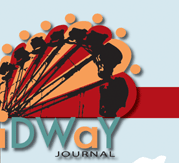


 |
|
|
|
|
|
|
|
|
|
|
|
|
|
|
|
|
 |

AN INTERVIEW WITH THALIA FIELD by Francis Raven
Thalia Field is the author of Point and Line (New
Directions, 2000), Incarnate: Story Material (New Directions, 2004), and
ULULU (Clown Shrapnel) (Coffee House Press, 2006). She teaches at
Naropa’s Summer Writing Program in addition to the Program for Literary Arts at
Brown University. Readers and writers of prose poetry should lend her 14 prose-poetic works that compose her new book, Incarnate: Story Material, their eyes, because her discreet experimental forms offer a beneficial direction for contemporary prose poets to develop. The fact that each piece is a singular experiment exploring a particular set of questions is of great benefit to the reader and allows more ground to be covered with each poem. Field demonstrates that prose poets should more often ask particular and peculiar questions so that their works continue to be singular. Field is a master of such forms; they are, to be sure, abstract and amorphous forms, but forms nonetheless. She invents these puzzles and subsequently fills them with solutions. Therefore, one of Thalia Field’s reader’s jobs is to solve the puzzle of her forms. That is, to work back through the ‘filling’ to the structure. These structures all respond to the twin nodes of (1) the body and (2) stories, hence the title of the book: Incarnate: Story Material. To follow this logic, the book unusually possesses two title poems, or more accurately, one title poem, “Incarnate,” and one subtitle poem, “Story Material.” “Incarnate” connects prison, hell, and disease, and in so doing, implicitly relates the number of demons in hell (6666*6666=44,435,556) to the number of people currently incarcerated (around 2.1 million in the U.S and 8 million worldwide). In one sense, in this poem, the reader is asked to consider the possibility that the reason she shouldn’t commit crimes is because she has a body, because she can be punished. In “Story Material,” Field retells (and cuts up and shuffles) the story of the Odyssey and gives it a visceral, animalistic, and bodily texture. The central concern of both title poems is how having a body relates to experience. Field has often been praised for her work at the border of poetry and theater. That is, she has taken the demands of each form equally, in each other. And, in Incarnate, she pushes these demands further by asking questions of the human form. After all, the body is the location where the demands of poetry and of theater might come together. As a result of this, the most satisfying poems in this volume address the question (and the demands) of the body. To investigate theater poetically requires an examination of voice and the multitude of relationships existing between other peoples’ voices and your own. This, in turn, entails an investigation of how we experience being as bodies. Incarnate takes both of these steps seriously. My email exchange with her illuminated many issues in her works. Francis Raven FR : Your new book, Incarnate, investigates the body and the circumstances of being incarnate, how did you become interested in being incarnate or in the idea of bodies? Do poetry and theater require different things of the body? TF : It’s more the idea that embodied is what the story comes out of: a sense of shape, of boundary, or individual being. Once the ‘body’ begins so do the stories, and, I suppose, the performances of stories. So it was my interest in how we tell ourselves believable stories that are also unbelievable, which led to the sense that being embodied, sensory, etc.—is where it begins. FR : Incarnate is filled with historical research (as in “Autocartography” or “Feeling into Motion”) and facts? How did you go about doing this research? Was it systematic or did you just go through subjects you were interested in? TF : Yes, nothing proceeds in my work in a systematic way and pieces develop slowly without a sense of direction. ‘Research’ is just my curiosity about things which then leads into an area where narrative or form kick in—eventually becoming pieces which can ‘turn out’ somehow for an audience... FR : How do you think facts fit into poetry? Is it difficult to work them in? TF : I don’t find so-called ‘facts’ to be much different than other kinds of stories—and this lets all the materials co-exist kind of equally—whether we “make something up” or just happen to “believe it” or find it to be scientifically true—it all seems to be about telling stories. I like the ways that “facts” bring in a sort of social story, a larger story which is being bandied about. FR : I noticed that you took the photograph on the cover of the book, feet resting beside a television in three shots, what drew you to this image? Why did you choose it to represent the poetry visually? TF : This is just a series I did a long time ago but there was also something about it which intrigued me—the embodied “watcher” of media stories—something resonated with the book in these photos so I used them for the cover. FR : How did you come up with the idea of having two title poems? TF : I just happened to write the two poems and they eventually had titles, but the title of the book was already the title of the book. Just a set of half-intentional accidents. FR : In your poem “Story Material” you rewrite the Odyssey. What made you want to do that? What was the most challenging aspect of that? Was it difficult not to make it merely a retelling? TF : It’s actually just a tiny scene, the Cyclops scene. Again, I got to this piece in a totally roundabout way—totally without meaning to. I was writing about hurricanes and thinking about the paradox of how things are “concealed” in their being when they appear—and all of this came together with some pre-Socratic philosophy and finally the Cyclops came in. I can’t tell you more than that—typically, the piece developed from many many directions at once and over a long time. FR : I saw that your forthcoming book, ULULU (Clown Shrapnel), is billed as a performance novel, what does that mean? TF : It’s a long novel based on a character from an opera—sort of a “cultural history” of a particular character. So there’s a lot of prose/poetry and a lot of dealing with performance... Hard to describe! FR : How did you become a poet? TF : I’ve written since I was a little kid. I never thought much about it until I was in my late 20s and got tired of doing theater and thought I had a better personality to just write and then get into theater sort of backward. So I worked more overtly at the writing part—made it more public—which was very hard at first. FR : Who were your mentors or influences? TF : The people who influenced me about being an artist were people who have worked their lives at art without worrying too much about the business of it, or getting too caught up in the “career” part to the expense of the working hard on one’s art part. I try to think of them every day. The most important thing is to love the work even when it’s the most difficult. FR : What category would you place your poetry in? TF : I have no idea—people seem to classify things all sorts of ways. I’m not sure it helps to try to classify myself. I write what happens in that moment of writing and let it just go from there. When it’s over it starts another journey and it’s better for me sometimes not to try to second-guess that one… FR : How has teaching changed your poetry? TF : I can’t tell you what’s changed because I teach or what’s changed just because everything I write is different than anything else I write. I don’t know how to separate out the different factors. I like teaching and learn a lot from the students, but my writing is mostly my own private weird thing and the two don’t often overlap overtly in any way. FR : What’s your working strategy? When do you write? How often? On a computer? Longhand? TF : I write on a computer or in notes by hand. Things take forever long to finish, even a very short piece could have been started ten years ago. They sit and “age.” Occasionally a piece happens quickly but that’s rare. Sometimes long periods go by and I don’t write at all. FR : Are there any current trends in poetry that you’re especially excited about? What about in theater? TF : I really like to have time to read or go to theater. I’m not that picky when work is good. And I’m definitely not a critic. I don’t have too many feelings that work “should be” one thing or another. I just like really good work. FR : What are you working on right now? TF : A chapter for a book on creative writing for a press in England. FR : What is the best advice you have for younger writers? TF : Be your own best audience, reader and friend. Don’t expect any rewards. FR : What’s the most difficult poem you have written and why? TF : There are pieces I’ve written which have failed to the point of not being possible to make public. This always saddens me a bit. I can’t seem to find their key. FR : How much you think a poet should write? TF : No rule on that one. I would say “never force it” but I’m not even sure I believe that. I haven’t a clue. People should do what works for them. | ||||
| ||||
